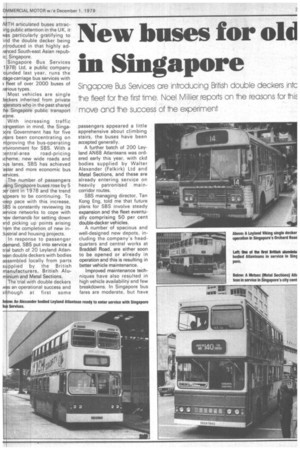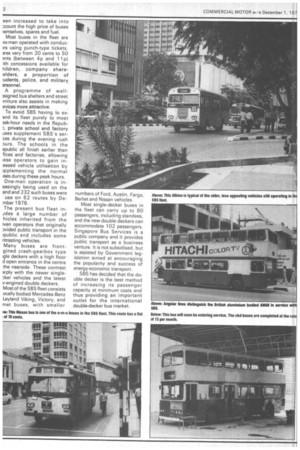New buses for old hi Singapore
Page 33

Page 34

If you've noticed an error in this article please click here to report it so we can fix it.
Singapore Bus Services are introducing .British double deckers intc —le fleet for ne first time. Noel Millier reports on ne reasons for ni move and e success of the experiment /V1TH articulated buses attracirg public attention in the UK, it as particularly gratifying to ind the double decker being ,nroduced in that highly ad/a ced South-east Asian repubic Singapore.
Singapore Bus Services 1 78) Ltd, a public company O nded last year, runs the A ge-carriage bus services with leet of over 2000 buses of /a ious types.
Most vehicles are single i kers inherited from private ) erators who in the past shared • 11 Singapore public transport ▪ ne.
With increasing traffic ngestion in mind, the Singa ) re Government has for five ars been concentrating on proving the bus-operating vironment for SBS. With a
; ntral-area road-pricing eme, new wide roads and s lanes, SBS has achieved -a ter and more economic bus ices.
The number of passengers J i ng Singapore buses rose by 5 3 r cent in 1978 and the trend pears to be continuing. To ep pace with this increase, 3 S is constantly reviewing its ice networks to cope with 1:w demands for setting down d picking up points arising m the completion of new instrial and housing projects.
In response to passenger. mand, SBS put into service a tr at batch of 20 Leyland Atlan
t n double deckers with bodies a sembled locally from parts s pplied by the British anufacturers, British Alu inium and Metal Sections.
The trial with double deckers eir s an operational success and
31 hough at first some .passengers appeared a little apprehensive about climbing stairs, the buses have been accepted generally.
A further batch of 200 Leyland AN 68 Atlanteans was ordered early this year, with ckd bodies supplied by Walter Alexander (Falkirk) Ltd and Metal Sections, and these are already entering service on heavily patronised maincorridor routes.
SBS managing director, Tan Kong Eng, told me that future plans for SBS involve steady expansion and the fleet eventually comprising 50 per cent double-decker vehicles.
A number of spacious and well-designed new depots, including the company's headquarters and central works at Bradclell Road, are either soon to be opened or already in operation and this is resulting in better vehicle maintenance.
Improved maintenance techniques have also resulted in high vehicle availability and few breakdowns. In Singapore bus fares are moderate, but have een increased to take into count the high price of buses iemselves, spares and fuel.
Most buses in the fleet are vo-man operated with conducirs using punch-type tickets. ares vary from 20 cents to 50 .nts (between 4p and 11p) ith concessions available for hildren, company shareolders, a proportion of :udents, police, and military, ersonnel.
A programme of well signed bus shelters and street irniture also assists in making irvices more attractive.
To avoid SBS having to exand its fleet purely to meet 3ak-hour needs in the Repub:, private school and factory uses supplement SBS's serces during the evening rush Durs. The schools in the epublic all finish earlier than fices and factories, allowing lese operators to gain ineased vehicle utilisation by ipplementing the normal ises during these peak hours. One-man operation is ineasingly being used on the and and 232 such buses were use on 62 routes by Dember 1978, The present bus fleet inudes a large number of hides inherited from the :yen operators that originally Dvided public transport in the 'public and includes some ntrasting vehicles.
Many buses are frontgined crash-gearbox type tgle deckers with a high floor d open entrance in the centre the nearside. These contrast 3rply with the newer single:...ker vehicles and the latest ir-engined double deckers. Most of the SBS fleet consists ocally bodied Mercedes-Benz Leyland Viking,, Victory, and met buses, with smaller numbers of Ford, Austin, Fargo, Berliet and Nissan vehicles.
Most single-decker buses in the fleet can carry up to 80 passengers, including standees, and the new double deckers can accommodate 102 passengers. Singapore Bus Services is a public company and it provides public transport as a business venture. It is not subsidised, but is assisted by Government legislation aimed at encouraging the popularity and success of energy-economic transport.
SBS has decided that the double decker is the best method of increasing its passenger capacity at minimum costs and thus providing an important outlet for the international double-decker bus market.
















































































































